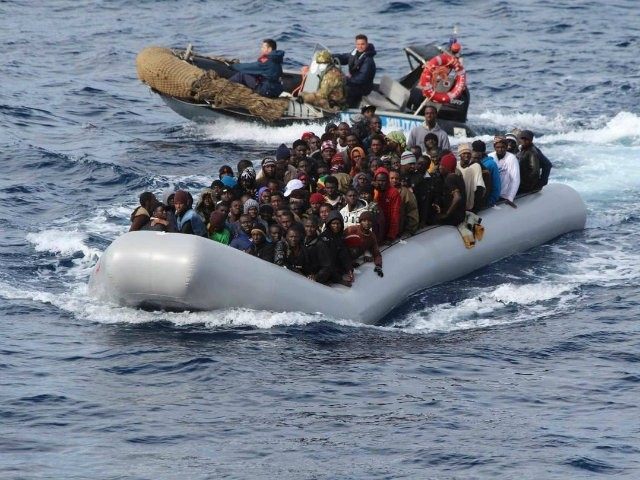This morning’s key headlines from GenerationalDynamics.com
- Europe faces ‘enormous tragedy’ over Europe’s Mediterranean rescue program
- Confusion reigns over Ukraine ceasefire deal
Europe faces ‘enormous tragedy’ over Europe’s Mediterranean rescue program

Rescue of migrants in rubber dinghy
At least 300 migrants have drowned in the Mediterranean Sea after their boats sank earlier this week. They had departed from Libya on Saturday in four rubber dinghies that sank after four days at sea. Only nine people were rescued out of hundreds of migrants trying to reach Italy’s Lampedusa Island.
Vincent Cochetel, UNHCR Europe bureau director, said:
This is a tragedy on an enormous scale and a stark reminder that more lives could be lost if those seeking safety are left at the mercy of the sea. Saving lives should be our top priority. Europe cannot afford to do too little too late.
This “tragedy” is going to force the European Union, once again, to go through a painful review of its search and rescue policy in the Mediterranean, to prevent it from turning into what Pope Francis called “a vast cemetery.”
Europe was forced into such a review after two tragic shipwrecks in October 2013 in which more than 400 Eritrean, Somali and Syrian migrants drowned. ( “16-Oct-13 World View — Sicily declares state of emergency as African migrants flood in”) After that, Italy began spending 9 million euros per month on a program called “Mare Nostrum” (Latin for “Our Sea”) to rescue drowning migrants trying to reach Italy.
Italy has been complaining since then that it should not entirely be Italy’s responsibility to rescue migrants in the Mediterranean, and that it should be a shared responsibility among all the EU nations. Naturally, other EU nations were perfectly happy letting Italy foot the entire search and rescue bill.
But after much haggling, the Mare Nostrum program expired in October, after which the search and rescue function was taken over by an EU operation called “Triton.” However, Triton’s budget is much smaller, just 2.9 million euros per months. And it restricts its operations to only within 30 miles of the Italian coast.
In the year from October 2013 to October 2014, Italy rescued about 100,000 refugees. Estimates are that 3,000 refugees have died in the Mediterranean 2014, critics are complaining that “multiples of the 3,000” will drown because Mare Nostrum was replaced by Triton. Adding to the concerns is that the number of refugees attempting the trip doubled in 2014 to 218,000 from the 2013 figure. The number is expected to increase further in 2015.
It is politically almost impossible for the EU or any democratic government to ignore and allow thousands of people to simply drown, no matter who is at fault. Pro-refugee activists claim that the EU has no choice but to increase its search and rescue budget again.
People smugglers charge desperate people from Syria and North Africa thousands of dollars each, stuff them all on a boat and send it out to sea, knowing that someone will rescue them (or not caring whether someone will rescue them). In a well-publicized case in December, people smugglers packed almost 1,000 people into a boat, after typically collecting thousands of dollars from each migrant, and sent the ship out into the open sea with no crew, running on autopilot. ( “2-Jan-15 World View — European migrant crisis escalates with crewless cargo ships”) The Italian navy was able to board the ship and take control of it.
Skeptics point out that having a robust search and rescue operation only encourages migrants to risk the trip. They argue that if there had been no search and rescue effort, then migrants would not attempt to reach Europe. Others point out that desperate people in Syria and Eritrea will take the risk no matter what Triton’s budget is. Irish Independent and UNHCR and Guardian (London, 31-Oct-2014)
Confusion reigns over Ukraine ceasefire deal
Ukraine ceasefire negotiations continued through the night in Minsk, the capital city of Belarus. The negotiators were Russia’s President Vladimir Putin, Ukraine’s leader Petro Poroshenko, German Chancellor Angela Merkel and France’s President François Hollande.
On Thursday morning, Putin came out and announced a ceasefire deal. According to the deal:
- The ceasefire will start on Sunday.
- Both sides will immediately pull back heavy weapons, starting on Sunday.
- The anti-Russian sanctions will end on Monday, unless extended.
- Kiev will resume sending pension checks, welfare payments, and government salaries to the districts under the Russians’ control.
- The Russian-held portions of east Ukraine, Donetsk and Lugansk, have special status, and are largely out of control of the Kiev government. They will have their own militias.
- Kiev will control the border with Russia again by the end of the year.
It’s hard to find anything meaningful in this. Do we believe that the anti-government Russians in east Ukraine are going to stop shooting? Do we believe that Russia is going to stop sending soldiers and weapons into east Ukraine? Do we believe that Putin will keep any commitment at all, if he doesn’t feel like it? A lot of people would answer “no” to all of these.
If the West lifts the sanctions on Monday, then Putin will have won a total victory, and completely humiliated the West. More likely, the sanctions will be kept in place, and nothing will have changed. We may have some answers by mid-week. AP and Globe and Mail (Toronto) and Russia Today
KEYS: Generational Dynamics, European Union, Italy, Mare Nostrum, Triton, Vincent Cochetel, UNHCR, Eritrea, Somalia, Syria, Russia, Vladimir Putin, Ukraine, Petro Poroshenko, Germany, Angela Merkel, France, François Hollande
Permanent web link to this article
Receive daily World View columns by e-mail

COMMENTS
Please let us know if you're having issues with commenting.